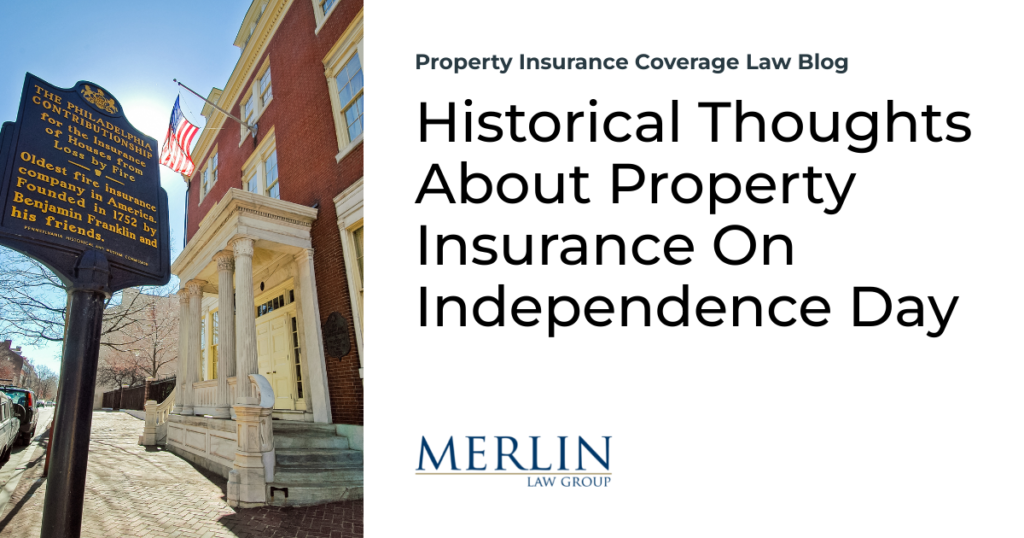Historical Thoughts About Property Insurance On Independence Day

Declaration of Independence signer Benjamin Franklin helped form The Philadelphia Contributionship For The Insurance of Houses From Loss By Fire in 1752. It is America’s longest tenured property insurer. It has withstood the test of time, has a rich history, and even a museum you can visit.
I also note a few insurance concepts while researching this insurance company. First, its underwriting was interesting. Initially, it did not allow for houses built entirely of wood—I always think of the Three Pigs fable about straw, wood, and brick when reading such underwriting criteria. Second, the company spent a lot of time surveying the properties it insured:
The early directors of The Philadelphia Contributionship adopted the English custom of inspecting and appraising a property to determine its value before accepting it for insurance. At the Board’s second meeting, the directors appointed two of their own members, Joseph Fox and Samuel Rhoads, as surveyors for the year, stipulating that at least one of them survey each house proposed for insurance. The surveyor was to make ‘a report in writing to the Clerk.’ These reports or surveys would then be discussed by the entire Board at its next meeting, which would determine the extent and rates of insurance. As compensation, the Board allowed the surveyor 2 shillings and sixpence for ‘Surveying and reporting the state of the Buildings to be Insured in one Policy.’1
There is a lot to be gained for the insurer, the policyholder, and the community when pre-loss underwriting and risk surveying is mandated. Unlike other products sold for the benefit of just the individual, insurance is a social product. Making safer and stronger structures is important for all of us. It has always been my opinion that we should encourage stronger buildings through more pre-loss risk analysis and risk of loss mitigation. As shown above, this is not a novel 21st century concept I am promoting.
Lemonade, the insurance company, is novel. Its initial public offering was made to much fanfare. Its prospectus, describing its operation as a “Lemonade Stand” shows how different its methodology of insurance operation promises to be, compared to The Philadelphia Contributionship:
Since the dawn of time, insurance has both propelled progress and been revolutionized by it. Early humans risk-pooled intuitively, earning a claim on communal provisions in bad times by sharing their bounty in good ones. The Agricultural Revolution transformed risk pooling from an adaptive instinct to a facet of trade, with ‘assurance’ included in loan agreements throughout antiquity. A slew of inventions in the 14th century triggered the Commercial Revolution, which saw the ousting of lenders from insurance, and the inauguration of the first insurance companies. These thrived until the Scientific Revolution, when the discovery of probability theory signaled the toppling of every insurance company that predated it, and the emergence of the insurance dynasties that have reigned ever since.
A new revolution now threatens these hegemons.
The World Economic Forum labeled the transformations we are experiencing today the Fourth Industrial Revolution, and with good reason. The pace and breadth of today’s innovations have no historical precedent, and they are spreading at an exponential, rather than linear, pace. As transformative as the prior revolutions were for insurance, there is reason to believe that today’s will be even more so. No part of the value chain is immune this time: distribution models, business models, statistical tools, systems of management, cost structures, corporate structures, corporate culture, technology stacks, user experience, marketing channels, data sources, data uses, value propositions, human capital — all these and more are being upended.
Which is why we founded Lemonade.
We wouldn’t know how to shepherd incumbents through these momentous changes; nor do we know of a technological solution to their innovator’s dilemma. Our analyses led us to conclude that a new kind of insurance company, built from scratch on an unconflicted business model and cutting-edge technology, will enjoy structural advantages that will manifest ever more powerfully over time.
Lemonade aspires to be such a company.
We recognize this is an audacious undertaking, and the journey will be long and bumpy. We are energized by the David vs. Goliath dynamic, and enjoy making things from scratch: brands, experiences, technologies, products, cultures, organizations. But Lemonade is not everyone’s cup of tea, which is why we wanted to outline our approach, in the hope that investors who share our thinking will be drawn to Lemonade, while those who do not will seek their fortunes elsewhere.
Things never stay the same. Old King George III had to live with rebellious Americans fed up with having grievances ignored. Possibly, the operational time-tested methods of old-guard insurance companies may not stand up to modern, cost-effective technologies espoused by those with new ideas. Time will tell.
There have been a lot of newly formed independent countries with allegedly better designed democracies and governments since our Declaration of Independence in 1776. It is easy to come up with new ideas. It is a lot more difficult to make them work in practice over a long period of time.
Thought For The Day
The Constitution only gives people the right to pursue happiness. You have to catch it yourself.
—Benjamin Franklin
_________________________________
1 http://www.philadelphiabuildings.org/contributionship/intro.cfm







